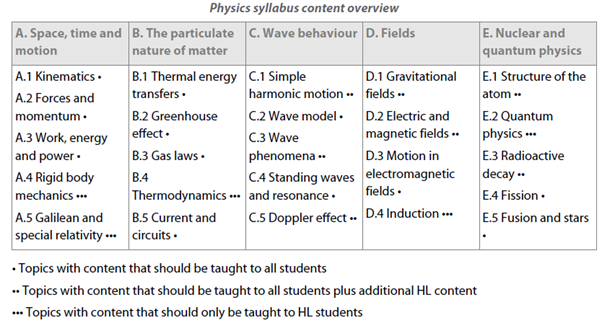The new DP physics course will be launched in February 2023 for first teaching in August 2023. First assessment will take place in May 2025.
Below you will find an overview of the course updates. For a technical breakdown of the DP curriculum and assessment methods for this course, read the physics subject brief (SL & HL)(PDF, 350 KB).
Overview of the new course
A relevant and effective physics education needs to reflect societal change with a greater focus on skills and the interconnectedness of concepts, contexts and content, and facilitate deep learning and student understanding.
The physics curriculum is grouped into five broad organizing themes, each of which are subdivided into several topics.

Conceptual learning
The new physics course is moving towards a reduction in content and highlights concepts that underpin learning. The course aims to develop understandings that connect factual, procedural and metacognitive knowledge and recognizes the importance of connecting learning with conceptual understanding. This includes a non-linear, ongoing process of adding new knowledge, evolving understandings and identifying misconceptions.
Conceptual understanding will enable students to be aware and critical of their own knowledge, and to transfer and apply skills and understandings to new or different contexts in creative, generative, autonomous and dynamic ways.
The syllabus structure has been re-imagined, incorporating subject specific concepts— energy, forces, particles—within a framework that focuses on models and concepts that enable teachers to create their own pathway for the two-year programme.
Greater emphasis on skill development
The practical nature of the subject is emphasized by the inclusion of a section in the guide ‘Skills in the study of physics.’ These are framed by the approaches to learning (ATL) skills and categorized into different aspects, including inquiry skills and techniques appropriate at this level of study.
Nature of science
Nature of science (NOS) is an overarching theme in the DP biology, chemistry and physics courses that explores conceptual understandings related to the purpose, features and impact of scientific knowledge. DP physics students will have the opportunity to analyze, discuss, challenge, and refine their understanding of the scientific ideas and concepts encountered during the course. An understanding of NOS is valuable on several levels:
- it develops scientific literacy
- it provides a framework in which students can more easily access the physics course content
- it supports student learning.
Experimental programme
Practical work
Practical work continues to be a central aspect of the DP physics course. Teachers are encouraged to develop their own practical scheme of work allowing students to gain a deeper understanding of the subject content and associated concepts, as well as to provide opportunities to develop a wide range of practical and investigative skills. The practical scheme of work should be broad and balanced to provide students with the opportunity to experience a wide range of tasks, from closed to open inquiry, and from hands-on experimentation through to the use of simulations and modelling, incorporating technology where appropriate.
Collaborative sciences project
The collaborative project from the current course will be given a refresh.
The collaborative sciences project is an interdisciplinary sciences project that addresses real-world problems that can be explored through the range of subjects in the sciences group.
Through this project students will:
- integrate factual, procedural and conceptual knowledge developed through the study of their science discipline(s)
- apply their collective understanding to develop solution-focused strategies that address the issue
- develop an understanding of how interrelated systems, mechanisms and processes impact a problem
- evaluate and reflect on the inherent complexity of solving real-world problems
- develop an understanding of the extent of global interconnectedness between regional, national, and local communities
- be empowered to become active and engaged citizens of the world
- gain appreciation of collective action and international cooperation
- strengthen their ATL skills, including teambuilding, negotiation and leadership.
The collaborative sciences project provides an excellent opportunity for students to work with those taking other DP sciences courses, either in their own school or from other IB World Schools.
Changes to the assessment model
External assessment
All students will only sit two external examinations.
Paper 1A includes multiple-choice questions and paper 1B includes data analysis questions. These papers provide an opportunity to assess some of the skills on graphing, units and uncertainties.
Paper 2 will begin with a number of short-response questions, each focusing on a narrow area of the curriculum and will end with one (for standard level) or two (for higher level) extended-response questions which take content from different areas of the guide, using one of the three concepts throughout the question.
Other changes include the removal of the option topics. From the current four option topics (relatively, engineering physics, imaging and, astrophysics) some of the content was incorporated into the course at either standard level or higher level.
Internal assessment
The ‘scientific investigation’ (internal assessment) will also see a change, with the opportunity for students to collaborate and support each other within small groups. Where appropriate, students will be able to share similar methodologies, provided that the independent or dependent variable differ, and the data collected is unique to each student.
Students will continue to submit an individual report with a maximum word count of 3,000 words.
The revised criteria will place a greater emphasis on higher-order thinking skills with 50% of the marks allocated for Conclusion and Evaluation.
What are universities saying about the subject?
"Physics is the fundamental course for most of our science majors. The knowledge of Physics gained through the IB Diploma Programme Physics course can be applied to Biology and Medicine, which are the foundations of the medical and veterinarian professions. It is strongly recommended that you take Physics if you wish to pursue a career in any science or applied science major."
Professor at the International School of Engineering - Chulalongkorn University, Bangkok, Thailand
This updated information is courtesy of the International Baccalaureate Organization and additional official updates will be found at their website www.ibo.org
